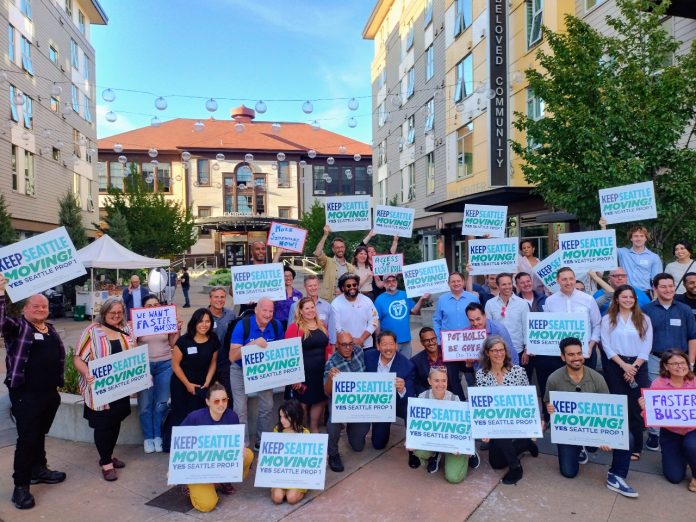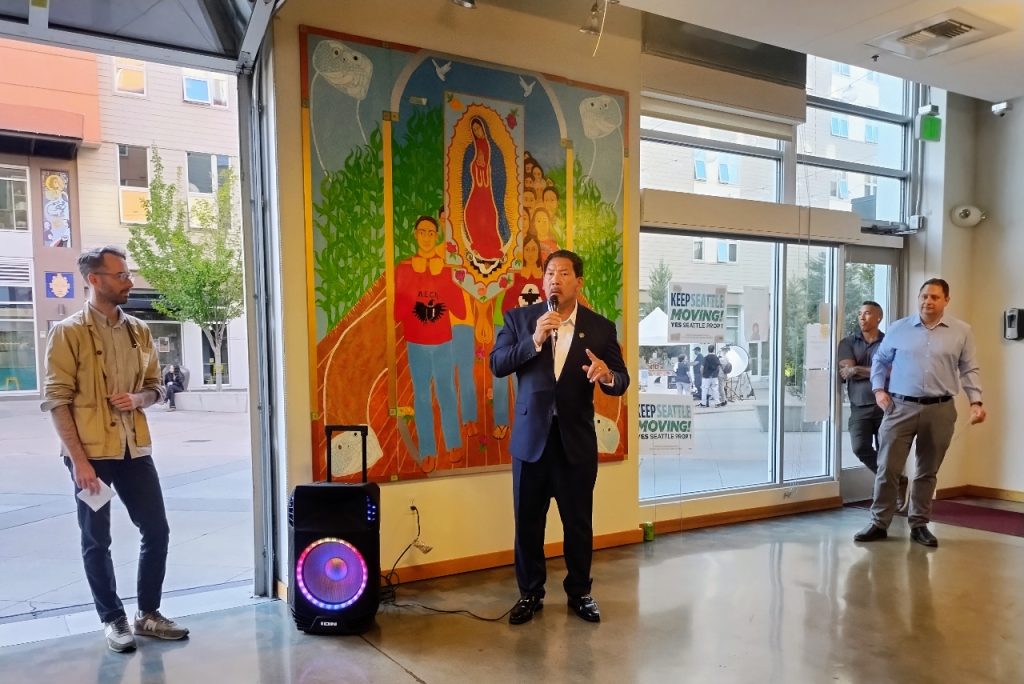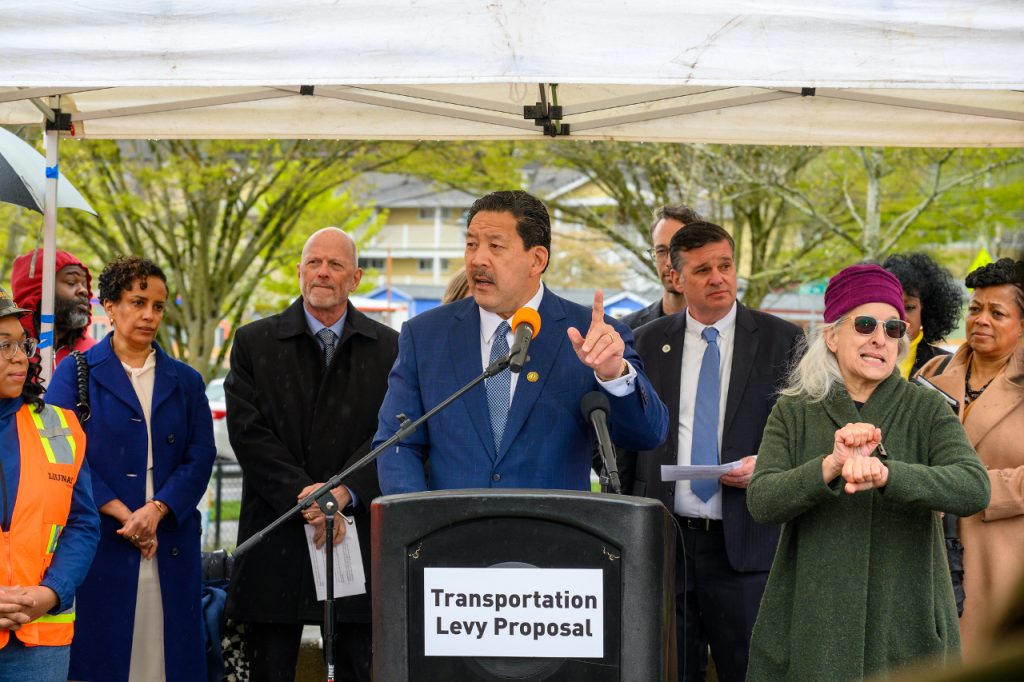
The campaign to approve Seattle’s next transportation levy kicked into a higher gear this week with the official launch of the “Keep Seattle Moving!” campaign. Backed by high-profile endorsements from both transportation advocacy organizations and business groups, the campaign is pushing to get a majority of Seattle voters behind the $1.55 billion, eight-year transportation funding package that the Seattle City Council unanimously approved this summer.
At an event in Beacon Hill Monday night, Mayor Bruce Harrell joined the levy’s core supporters for a formal kickoff as the independent campaign staff prepare for the final eight weeks before the November 5th election.
Harrell’s levy proposal, lightly amended by the city council, focuses heavily on core transportation maintenance spending, with over a third of levy dollars earmarked for road and bridge maintenance, but it also includes funding to build 320 blocks of sidewalks, add traffic safety improvements, and expand the city’s bike network across key connections.
Praising the advocacy community for pushing to include their priorities in the levy’s spending breakdown, Harrell then extended that praise to the levy’s planned investments.
“Let me make something very clear, that our country was built on advocacy. Our labor movement was built on advocacy. Our fight against climate change is based on advocacy. You are supposed to advocate for that which you are passionate about. This investment, it is bold because we have bold leadership, community leadership in the city,” Harrell told attendees. “This levy represents everything that is good about this city, so the dollar breakdown is irrelevant when we are talking about safety, climate change, resilience, bridges, potholes, roads, bike lanes, everything we could do. It represents the best of the best.”

Many of Seattle’s transportation advocacy organizations had initially pushed for the City to go much bigger than a $1.55 billion levy, which will only outpace monetary inflation by around 30%. With a majority of respondents in a Northwest Progressive Institute poll earlier this year saying they’d support a $1.9 billion levy, there was a considerable push to include more sidewalk funding, transit upgrades, and safety improvements in the final levy. But in the end, an amendment from Councilmember Tammy Morales to increase the total to $1.7 billion only served as a counterpoint to galvanize business support around the $1.55 billion number.
But despite a clear preference to go bigger, many transportation advocacy groups have now backed the smaller compromise version, including Seattle Neighborhood Greenways, the Transit Riders Union, and Cascade Bicycle Club. These groups are likely betting that rejecting a levy in November would lead to a smaller levy in the future, not a larger one — not to mention a fiscal cliff for the Seattle Department of Transportation, which gets 30% of its funding from the Move Seattle Levy, which expires at year’s end.
“The decision to endorse the 2024 levy comes on the heels of months of advocacy to increase investments for walking, biking, and connections to transit. While the proposed levy doesn’t fully rise to meet the city’s identified needs, the $1.55 billion 2024 transportation levy headed to voters this November is a balanced compromise and deserves your vote,” the Seattle Neighborhood Greenways endorsement of the levy said.
Seattle Greenways’ endorsement noted that this levy is poised to be more flexible in its priorities than 2015’s Move Seattle Levy, offering opportunities for advocates.
“Flexibility is good, but it means there will be a critical role for ongoing advocacy to hold the city accountable to its goals around climate, equity, accessibility, and safety,” Seattle Greenways wrote. “If we are vigilant and fight for these critical outcomes, the Seattle Transportation Plan and this funding levy could make Seattle one of the best cities to walk, bike, and take transit in the United States. But we will need your continued engagement to help push our city to achieve its highest potential.”
Seattle’s business community also appears fully on board, with the Seattle Metropolitan Chamber of Commerce voting to endorse in August. “We care about potholes, we care about bridges, we care about access to transit: these are all very important investments for the business community,” Lars Erickson, the Chamber’s senior vice president, said Monday. “We support strategic investments in freight. It’s important for packages to get delivered to your homes, good for businesses to get the deliveries they need on time. We support the funding to improve Third Avenue, in particular, and in other parts of downtown, before hundreds of thousands of people descend on Seattle for the 2026 FIFA World Cup.”

During Council deliberations, the Chamber pushed for the amount allocated to freight investments to be beefed up, aligning with recommendations from the Seattle Freight Advisory Board. With several high-profile freight projects including the S Lander Street overpass and E Marginal Way S street rebuild in the soon-to-expire levy, the new levy proposal initially didn’t include much freight spending, but was revised to bring the total amount of spending up to $45 million.
On Tuesday, the Port of Seattle Commission also voted to endorse the levy, in a 3-0 vote, with the freight funding undoubtedly playing a major role. Commissioners Hamdi Mohamed and Sam Cho, both City of Seattle employees, recused themselves from the discussion and vote.
“The thing that I would say about this levy that I really appreciate is it focuses on infrastructure for residents and businesses,” Commissioner Ryan Calkins said. “Oftentimes, over the last couple of generations, a lot of the improvements we made to our transportation corridors has been to accommodate long commuters, and I’m really grateful that we’re taking an opportunity to add to that kind of funding, funding that supports pedestrians and bikers, and last mile for freight that’s coming from our ports to our distribution centers.”
As for opposition to the levy, former Councilmember Alex Pedersen has so far emerged as the primary surrogate urging a no note. An opponent of 2015’s Move Seattle Levy as well, Pedersen served four years on the council as transportation committee chair but departed before work started on this renewal. In an email sent to his mailing list that railed against the proposal, Pedersen pushed for the city to instead adopt transportation impact fees, a tax on new housing construction that he lobbied for during his time on council. He also targeted bicycle safety spending — 8.5% of expected total levy spending — as an egregious earmark.
“The Prop 1 tax is inequitable and unfair because it squanders your money on expensive pet projects for interest groups like bicycling clubs,” Pedersen wrote.
The Keep Seattle Moving! campaign appears to be betting that most Seattle residents find fearmongering about scary bike lanes tiresome and dated. While many urbanists would likely support a larger levy, business groups and mobility advocates have seemed to found agreement that approving Prop 1 represents the best path forward to creating a more equitable, safe, and sustainable transportation system in Seattle.
Ryan Packer has been writing for The Urbanist since 2015, and currently reports full-time as Contributing Editor. Their beats are transportation, land use, public space, traffic safety, and obscure community meetings. Packer has also reported for other regional outlets including BikePortland, Seattle Met, and PubliCola. They live in the Capitol Hill neighborhood of Seattle.

